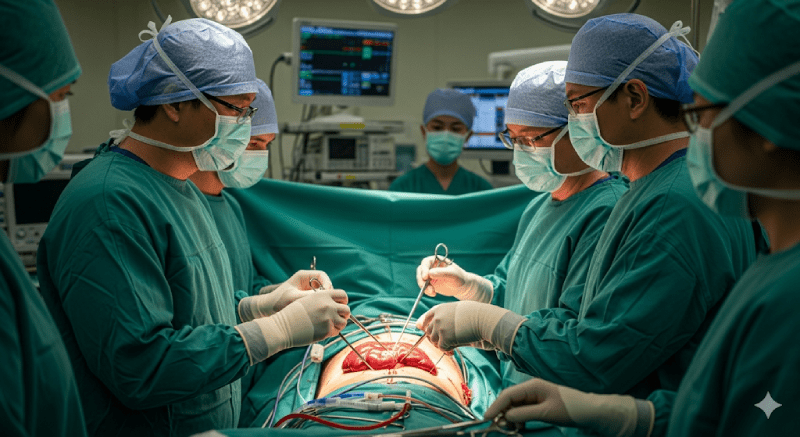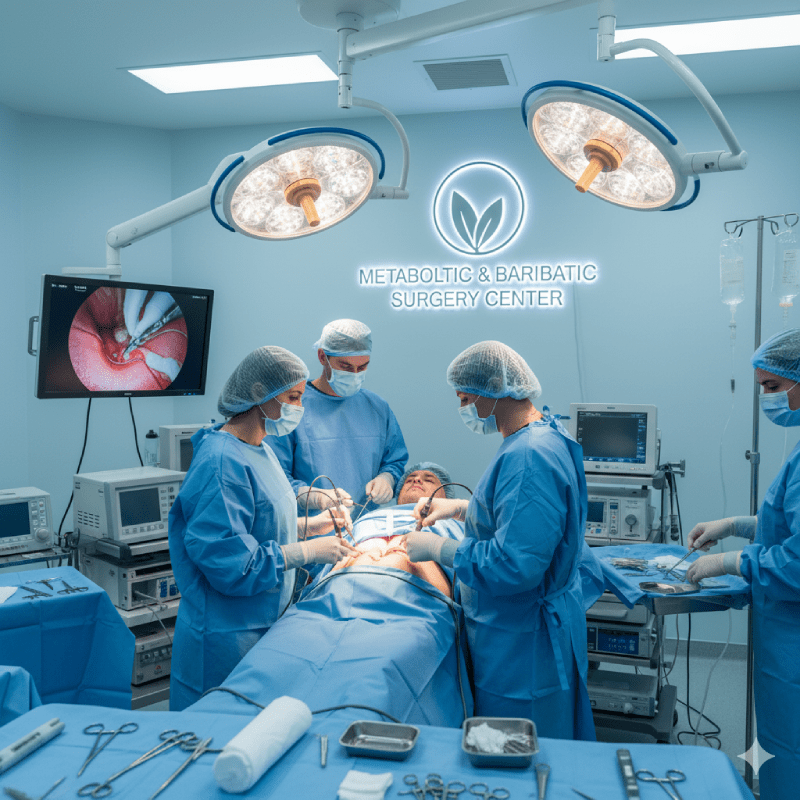What is Gastric Sleeve?
Gastric sleeve is a bariatric surgery method where approximately 75-80% of the stomach is surgically removed, creating a tube-shaped stomach. As a result of this procedure, the stomach’s food intake capacity is significantly restricted, and since the part that produces the hunger hormone (ghrelin) is also removed, the patient’s appetite decreases. This aims to achieve weight loss by providing a feeling of fullness with less food and controlling appetite. The surgery is typically performed using a laparoscopic (keyhole) method.
Who is a Suitable Candidate for Gastric Sleeve Surgery?
Suitable candidates for the surgery are generally morbidly obese individuals between the ages of 18-65 with a body mass index (BMI) of 40 or higher. Those with a BMI of 35-40 who also have obesity-related co-morbidities such as type 2 diabetes, high blood pressure, or sleep apnea are also considered eligible for surgery. The decision for surgery is made by a multidisciplinary team after evaluating the patient’s physical and psychological condition.
How Long Does the Surgery Take?
Gastric sleeve surgery typically lasts an average of 1 to 2 hours. This duration may vary depending on the surgeon’s experience and the patient’s anatomical structure. The surgery is performed under general anesthesia. It is carried out laparoscopically, entering through a few small incisions in the abdomen with the help of special surgical instruments to perform the stomach reduction.
How Long is the Hospital Stay After Surgery?
The hospital stay after surgery is generally 2 to 4 days. During this period, the patient is closely monitored, pain is controlled, and a gradual liquid diet is introduced. The doctor and dietitian provide information about the post-operative nutrition plan. The patient is discharged when their general condition is stable and the risk of complications is deemed low.
Is There Pain After Surgery?
It is normal to feel mild to moderate pain for the first few days after surgery. This pain is typically felt at the incision sites and inside the abdomen. Pain is managed with painkillers during the hospital stay to increase the patient’s comfort. Painkillers recommended by the doctor can also be used after discharge. The pain gradually subsides and usually disappears completely within a few weeks.
What is the Post-Operative Nutrition Plan?
You will definitely be given a diet list after sleeve gastrectomy surgery in Georgia. This list is very important so that you can get used to the new state of your stomach without difficulty. If you are going to have gastric sleeve surgery in Georgia, the diet list that will be given to you after the surgery will likely include a gradual transition to solid foods. In short, you will be able to consume liquid first after sleeve gastrectomy surgery. Liquid foods will include clear liquids such as milk, water, chicken broth. It is important that there are no solid particles in these liquids.
On the other hand, once your stomach starts digesting liquids easily, you will switch to purees. Again, it will be possible to eat purees that do not contain grains and solids. These purees should include boiled and pureed fruits and vegetables. However, you can also feed on yogurt and soups. This feeding phase will last up to 2 weeks. You will then gradually switch to solid consumption.
However, this solid consumption should not include white bread, chocolate or products that are harmful and difficult to digest. During the transition to solid, you should be in contact with your dietitian and exchange views on the foods you can take.
On the other hand, do not hesitate to get support from your dietitian at every opportunity until you get used to your nutrition routine. This is important for a faster and more comfortable healing process.
How Much Weight Loss Can Be Expected?
Weight loss after gastric sleeve surgery is most significant within the first year. Patients are expected to lose 60% to 70% of their excess weight. This rate varies depending on the patient’s adherence to post-operative dietary rules, exercise routine, and lifestyle changes. Long-term weight maintenance success depends on adopting lasting habits.
What are the Long-Term Effects of the Surgery?
In the long term, gastric sleeve helps to improve or completely resolve obesity-related diseases (such as diabetes, hypertension, and sleep apnea) in addition to weight loss. This significantly increases the patient’s quality of life. However, long-term success requires regular follow-ups, vitamin and mineral supplements, and a commitment to a healthy lifestyle. The stomach’s volume may expand slightly over time.
What are the Most Common Risks of the Surgery?
As with any surgical procedure, gastric sleeve surgery has some risks. The most common risks include infection, bleeding, leakage from the staple line, pulmonary embolism, and complications related to anesthesia. However, these risks are minimized with an experienced surgeon and appropriate hospital conditions. A detailed pre-operative evaluation helps to identify these risks.
Is Hair Loss Experienced After Surgery?
Due to rapid weight loss and dietary restrictions after surgery, some patients may experience temporary hair loss. This condition usually begins a few months after the surgery and improves as the body adapts to the new situation and the nutritional regimen becomes stable. Adequate protein, vitamin, and mineral intake help to reduce hair loss. Follow-up with a dietitian and doctor is important in this regard.
Can the Stomach Expand After Surgery?
Yes, if post-operative dietary rules are not followed and excessive food is consumed, the remaining part of the stomach can expand over time. This can lead to weight regain. Therefore, it is important to view the surgery as just the beginning and to adopt lifelong healthy eating habits. Regular follow-ups and adherence to the dietitian’s recommendations minimize the risk of expansion.

How is Sexual Life Affected After Surgery?
Gastric sleeve surgery can improve sexual dysfunction related to obesity. Weight loss increases energy levels, physical performance, and self-confidence. This positively affects sexual life. However, it may be necessary to abstain from sexual activity during the post-operative recovery period. It is best to discuss this with your doctor.
When Can I Start Exercising?
In the first few weeks after surgery, low-intensity exercises such as light walking can be started. High-intensity exercises and weightlifting are generally recommended to be started 1-2 months after the surgery. Exercise is vital for accelerating weight loss, preserving muscle mass, and improving overall health. Always consult your doctor before starting.
Can I Get Pregnant After Surgery?
If pregnancy is planned after gastric sleeve surgery, it is recommended to wait at least 12-18 months. This period is necessary for the body to adapt to the surgery and rapid weight loss, and for vitamin and mineral levels to stabilize. This waiting period is important for the health of both the mother and the baby. A planned pregnancy should always be under the supervision of a doctor.
Is Vitamin Use Necessary After Surgery?
Yes, it is generally necessary to take vitamin and mineral supplements for life after gastric sleeve surgery. Due to the reduced stomach size and smaller area for nutrient absorption, the body may not be able to absorb some important vitamins and minerals (such as vitamin B12, iron, and calcium) sufficiently. Deficiencies should be monitored with regular blood tests, and supplements recommended by the doctor should be taken regularly.
What are the Psychological Effects of the Surgery?
The surgery can have both positive and negative psychological effects. Weight loss and increased physical abilities improve self-confidence and quality of life. However, radical changes in eating habits, difficulties that may be experienced in social life, and changes in body image may require psychological support. Receiving psychological counseling before and after the surgery can facilitate this process.
What Kind of Preparation is Required Before Surgery?
The pre-operative preparation process includes detailed medical examinations, blood tests, endoscopy, and if necessary, a psychological evaluation. The patient must quit smoking and alcohol, adhere to the dietitian’s recommendations, and prepare themselves physically. These preparations are made to increase the safety of the surgery and minimize potential risks.
What Determines the Cost of the Surgery?
The cost of gastric sleeve surgery varies depending on the hospital’s location, the surgeon’s experience, the city where the surgery is performed, and the materials used. The surgery price usually covers pre-operative and post-operative follow-ups, hospital expenses, and consumables. To get clear information about pricing, it is necessary to contact the relevant hospitals.
Do Scars Remain After Surgery?
Since gastric sleeve surgery is performed laparoscopically, only a few small incision scars remain on the abdomen. These scars fade over time and become almost unnoticeable. They are generally 1-2 cm long and cause minimal aesthetic concerns. The doctor’s recommendations for scar care should be followed after the surgery.
What is the Difference from Non-Surgical Weight Loss Methods?
While non-surgical weight loss methods usually give short-term results, gastric sleeve surgery provides permanent and significant weight loss. The surgery physically enables eating less by reducing stomach volume and biologically helps with weight control by reducing the hunger hormone. This offers a chance for long-term success that non-surgical methods cannot achieve.
When Can I Return to Work After Surgery?
The time to return to work after surgery depends on the physical intensity of the job. Those who work in an office job can generally return to work in 1 to 2 weeks. Those who work in a more physically demanding job may need to wait 4 to 6 weeks. These periods are important for the body to fully heal and for energy levels to return to normal.
Can I Consume Alcohol?
Alcohol consumption should be strictly avoided for the first 6 months after surgery. Due to the reduced stomach size, alcohol is absorbed much faster and rapidly raises the blood alcohol level. Additionally, alcohol can cause dehydration and negatively affect weight loss due to its high calorie content. In the long term, it should be consumed in very limited amounts and under a doctor’s supervision.
Can I Smoke After Surgery?
Smoking after surgery delays wound healing and increases the risk of complications. Smoking can increase the risk of staple line leakage and lead to stomach ulcers. Therefore, it is vital to quit smoking before the surgery and to absolutely not smoke after it.
Can Eating Disorders Develop After Surgery?
The surgery changes eating habits physically, but it does not treat underlying eating disorders. Therefore, some patients may develop different eating disorders (lack of portion control, night eating syndrome, etc.) after the surgery. Receiving psychological support before and after the surgery helps to reduce this risk.
What is the Failure Rate of the Surgery?
Surgical failure is usually associated with the patient’s inability to adapt to lifestyle changes and weight regain. The technical failure rate of the surgery is low. The success rate can be over 80%, depending on the patient’s commitment to the nutrition and exercise program. Viewing the surgery as a tool and embracing it as a lifelong transformation is critical for success.
Can the Surgery be Reversed?
Gastric sleeve surgery is an irreversible procedure because a part of the stomach is removed. Therefore, all risks and expectations should be evaluated in detail before the decision to undergo surgery is made. This permanent change requires a radical transformation in the patient’s lifestyle.
Is There a Problem with Insufficient Nutrition?
In the early stages after surgery, there may be a problem with insufficient nutrition due to restrictions on food intake. However, this problem is overcome by following the phased nutrition plan prepared by a dietitian and taking necessary vitamin supplements. In the long term, focusing on portion control and nutritious foods is important for adequate and balanced nutrition.

How Often Should Post-Operative Check-ups be Done?
Post-operative check-ups are more frequent in the first year (weekly in the first month, then monthly). In the following years, a check-up every 6 months or once a year may be sufficient. During these check-ups, the patient’s weight, nutritional status, and vitamin-mineral levels are monitored. Regular check-ups are vital for the early diagnosis and resolution of potential problems.
What Foods Should be Avoided After Surgery?
In the early period after surgery, solid, spicy, fatty, and sugary foods should be avoided. Carbonated drinks, alcohol, and caffeinated beverages can also upset the stomach. In the long term, it is recommended to stay away from high-calorie, low-nutrient “empty calorie” foods. Nutritious foods should be preferred for healthy weight loss and maintenance.
What is the Difference Between Gastric Sleeve and Gastric Bypass?
Gastric sleeve only restricts volume by reducing the stomach. Gastric bypass, on the other hand, both reduces the stomach and bypasses a part of the small intestine to reduce nutrient absorption. Gastric bypass is a more complex surgery and is generally performed on patients with a higher BMI or those with additional metabolic diseases.
Is Individual Therapy Necessary After Surgery?
Gastric sleeve surgery is not only a physical change but also a psychological process. The radical changes in eating habits and the process of adapting to a new lifestyle can be challenging. Therefore, receiving psychological support before and after the surgery increases success and helps prevent potential eating disorders.
How Does the Feeling of Fullness Change After Surgery?
After the surgery, the patient’s appetite decreases because a large part of the stomach that produces the hunger hormone ghrelin is removed. In addition, the feeling of fullness is achieved with very small amounts of food thanks to the reduced stomach volume. This helps the patient consume fewer calories, supporting weight loss and helping to control the feeling of hunger.
How is Social Life Affected After Surgery?
There may be some changes in social life after surgery. Social events centered around food can be challenging. However, thanks to weight loss and increased energy levels, there is an opportunity to participate more actively in social life. Explaining the situation to friends and family and asking for their support can facilitate this process.
What is the Effect of the Surgery on Hiatal Hernia and Reflux?
Gastric sleeve surgery can worsen reflux in some patients or cause new reflux symptoms. This is due to the reduction of the stomach and the increase in internal pressure. This condition can be managed with lifestyle changes or medication. The risk of reflux should be determined with a detailed evaluation before the surgery.
Recovery After Gastric Sleeve Surgery
If you planning Gastric sleeve surgery in Georgia, you can expect to spend some of your recovery at the hospital where you received your treatment. Although gastric sleeve surgeries are often not risky with successful treatments, patients should spend at least 4 days in the hospital after surgery. This is important to ensure that patients achieve successful results. However, after the treatment, patients must have a friend with them. After the operation, your movements will be limited and you will need help with your personal needs as well as with your household chores.
You won’t even to drive for at least 3 weeks. Therefore, be sure to have a relative with you. In order to speed up your recovery process, you should follow your doctor’s recommendations and take the medications he prescribes regularly. However, you should also keep in touch with your dietitian and consult everything about your nutrition.
Thus, your healing process will be accelerated and it will be painless. However, you should also know that if you get Gastric sleeve surgery in Georgia, you will have problems such as nausea and pain during your recovery. So try to rest in situations and do not eat anything. These complications, which are quite normal, will go away completely within a few days. Do not hesitate to do your needs such as toilets with support. The floors of areas such as bathrooms are slippery. In one small wrong move, your sutures may open and your surgery may end badly. Be careful to be careful in your healing process.
Is There an Age Limit for the Surgery?
The general age limit for gastric sleeve surgery is between 18-65 years. For patients under 18 or over 65, the decision for surgery is made on an individual basis and according to their general health status. In this case, the risk-benefit balance is carefully evaluated, and it is ensured that the benefits of the surgery outweigh its risks.
Georgia Gastric Sleeve Surgery
Georgia is a very expensive country for gastric sleeve surgeries. Unfortunately, it is almost impossible to get treatment in this country where there are many medical centers. For this reason, patients prefer to receive treatment in countries close to Georgia at more affordable prices instead of gastric sleeve in Georgia . This country is usually Turkey. Gastric sleeve prices in Turkey are so affordable that patients who have sleeve gastrectomy surgery in Turkey gain a great advantage. Instead of paying excessively high prices in Georgia, you can plan a gastric sleeve treatment slide in Turkey.
Gastric sleeve treatments in Georgia are even more expensive than in countries with high cost of living such as the USA and the UK. Isn’t that too high? Of course, patients who do not want to pay these prices plan to have gastric sleeve treatment in Turkey with the best price guarantee. You can also contact us for tube stomach treatment in Turkey. Thus, you will be treated by paying 1/10 of the general prices in Georgia.
Atlanta Bariatric Center
Atlanta bariatric Center is the most preferred center in Georgia. Located in Atlanta, this center is very successful and experienced as they perform dozens of gastric sleeve surgeries per day. Unfortunately, this only applies to very wealthy patients. Apart from this, of course, patients can receive the same quality treatments in Turkey. At the same time, it will be easier for you to get gastric sleeve treatment so successfully in Turkey, while it is the only best place to get Gastric sleeve treatment in Atlanta. Because Turkey has a well-known reputation and success in health tourism. This has enabled Turkey to have very successful and experienced bariatric surgery centers in almost every city. Instead of getting treatment at these prices, you can get successful treatments at much more affordable prices by paying less than the gastric sleeve prices of the Atlanta bariatric surgery center.
Best Hospitals for Gastric Sleeve in Georgia
As mentioned above, Atlanta Bariatric Center is the best hospital in Georgia. If you agree to pay high prices for gastric sleeve prices in Georgia, you can receive highly successful treatments at the Atlanta Bariatric center. You should also know that the treatments you will receive in this center will be much higher than the prices in the market. Because this center has made a name for itself and is the most successful Bariatric surgery center in Georgia. The success rate of the treatments you will receive from here will be the same as if you choose to have gastric sleeve surgery in Turkey.
If you are planning to have gastric sleeve surgery in Georgia, unfortunately the only option for a good treatment is the Atlanta bariatric center. However, this is not the case in Turkey. If you prefer to have Gastric sleeve surgery in Turkey, you can get Gastric sleeve surgery in Istanbul, Gastric sleeve surgery in Antalya, Gastric sleeve surgery in Kusadasi. You can also combine your treatments with a vacation. If you only have half the money required for treatment in Georgia, you can have a very luxurious holiday in Turkey, at the same time you can get treatment with all-inclusive package services.
Georgia Gastric Sleeve Surgery Price
You should know that you have to pay thousands of euros extra to get gastric sleeve treatment in Georgia. However, for treatments you will have to pay even more than the prices quoted in the USA, UK and Germany. You should know that the cost of living is quite high in these countries, which provide the best treatments to world health standards.
Despite this, the country with the highest price is Georgia. Instead of paying this much for gastric sleeve surgery in Georgia, you can get gastric sleeve surgery in Turkey. You should know that the minimum price you will pay for gastric sleeve surgery price in Georgia is 14,000€. Isn’t that an extremely high price? These neural patients mostly prefer to have gastric sleeve surgery in Turkey. By choosing this country, as we wrote above, you can spend a long luxury holiday for half the price, and you can also get your treatment in all-inclusive packages.
Gastric Sleeve Price in Turkey
The proximity between Georgia and Turkey causes many patients to prefer Turkey for treatment. But when you think about it, even if the distance between Turkey and Georgia is much longer, patients would prefer to have the tube stomach treatment in Turkey. The difference in price is the cost requested for the gastric sleeve price in Georgia and the gastric sleeve treatment as an all-inclusive package for 4 people in Turkey. You can also contact us to take advantage of these affordable prices in Turkey.
Do not forget that the price of gastric sleeve surgery in Turkey may be the best price in the world. However, you can choose us for treatment with the best price guarantee in Turkey. With the special prices we have in the best hospitals in Turkey. We ensure that our patients receive the best treatments at the best prices.
As Cure Holiday, our gastric sleeve prices are divided into 2.250 € treatment price and 2.700 € package price. Package prices, although only the treatment is included in the treatment price;
- 3 days hospital stay
- 3 days accommodation in a 5 star hotel
- Airport transfers
- PCR test
- nursing service
- Medication



